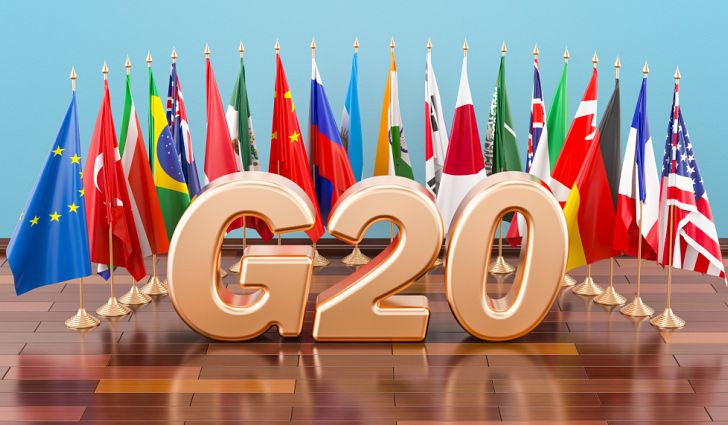-

- Ye Yu
- Associate Research Fellow
- Center for Asia-Pacific Studies
- Institute for World Economy Studies Assistant Director
- How to Make a Truly Democratic and ...
- China can inject new dynamics into ...
- BRICS can lead Global South
- How G20 meeting could defuse world ...
- ‘Belt and Road’ initiative must wor...
- China’s Foreign Policy under Presid...
- Criticism of CPEC is proof of progr...
- Can China help shape global governa...
- The Contexts of and Roads towards t...
- Seeking for the International Relat...
- Fostering the cross-border infrastr...
- The Belt and Road Initiative and Th...
- Wuhan 2.0: a Chinese assessment
- The Establishment of the Informal M...
- Identifying and Addressing Major Is...
- Identifying and Addressing Major Is...
- “Polar Silk Road”and China-Nordic C...
- Identifying and Addressing Major Is...
- Opportunities and Challenges of Joi...
- Wuhan 2.0: a Chinese assessment
- G20 Development Agenda and 2030 Age...
- BRI in Oman as an example: The Syn...
- Coronavirus Battle in China: Proces...
- China’s Fight Against COVID-19 Epid...
- Revitalize China’s Economy:Winning ...
- International Cooperation for the C...
- Working Together with One Heart: P...
- The Tragedy of Missed Opportunities
- The Tragedy of More Missed Opportun...
- The US Initiatives in Response to C...

On 15 April 2020, the G20 Finance Ministers and Central Bank Governors called for all bilateral official creditors to suspend debt service payment for the 73 poorest countries from 1 May to the end of 2020. This G20 Debt Service Suspension Initiative (DSSI) is probably the most important collective action that the G20 has taken in response to COVID-19.
DSSI-eligible countries have a total of US$31 billion dollars of payments due in the period covered. Bilateral official creditors, multilateral official creditors and private creditors owe 35, 23 and 42 per cent, respectively, in debt service payments. Private sourced credit, especially sovereign bonds, is the highest debt burden, representing a sharp difference from when official creditors historically dominated lending to poor countries.
But the DSSI only requires the participation of bilateral official creditors, as long as the debtor countries apply for the treatment. Private creditors are ‘strongly encouraged’ to participate in the DSSI on comparable terms, while multilateral creditors are called on to ‘explore the options for the suspension of debt service payments over the suspension period’.
China was very quick to endorse the DSSI when it was first proposed on 23 March by President of the World Bank Group (WBG), David Malpass. This was the most important step in the G20’s being able to reach a consensus in only three weeks. China owns about 67 per cent of the DSSI-covered bilateral official credit, 17 per cent of commercial bank credit and only a negligible portion of sovereign bonds. Chinese President Xi Jinping was then the first to propose an extension of the DSSI into 2021 at the Extraordinary China–Africa Summit on Solidarity Against COVID-19 on 17 June.
Considering Chinese participation in the DSSI, debt suspension itself is actually not the most significant thing to celebrate. What is really groundbreaking is that this is the first time China has participated in a multilateral debt management process of this kind.
China missed a golden opportunity to join the Paris Club in 2016 during its presidency of the G20. But China did start participating in its activities as an observer. This paved the way for China to sit together with the Paris Club and agree on the DSSI under the G20, just like the evolution from the G7 to the G20. Though not a formal member of the Paris Club, China is implementing the DSSI based on the same term sheet as its members.
One question about Chinese implementation of the program is whether the China Development Bank (CDB) should participate. The G20 does not define the scope of ‘bilateral official creditors’. The CDB considers itself a ‘commercial lender’ — its operational model is basically the same as that pf the World Bank. It relies heavily on funding from the financial market and acts very conservatively as the regulatory bodies treat development finance institutions and commercial banks almost in the same way. Still, CDB should more actively respond to the G20’s call to participate in the DSSI, despite only having high stakes in Angola among the countries most affected.
Debt suspension is not all the DSSI is about. The G7 Finance Ministers’ Statement on Debt Transparency and Sustainability indicates a focus on enhancing debt transparency on the creditors’ side through the DSSI. China is not in denial about legitimate concerns over debt transparency for poor countries’ debt sustainability management. Improving fiscal system and debt sustainability management is a top domestic policy agenda item for China. China has now agreed to the WBG publishing its external credit to the DSSI countries for the first time from 19 June.
There are important differences in the details between different members. What China committed to under the G20 was to ask countries which are beneficiaries to ‘disclose all public sector financial commitments (debt), [while] respecting commercially sensitive information’. But the G7 statement did not mention this at all. There is no definition or standard for ‘commercially sensitive information’, including what, when and where in regards to such disclosure.
Development finance agencies of the G7 countries are also not meeting the requirements of civil society. The biggest deficiency of the scheme lies in the role of private creditors. They still do not have any depository of data, even though the Institute of International Finance issued a high-standard voluntary Principles for Debt Transparency in 2019.
Considering the severity of the pandemic-induced recession, the DSSI is only the start of sovereign debt restructuring cooperation. Given the current US posture toward China, it is unrealistic to expect China to be able to join the Paris Club, but ad hoc coordination can still work. China can be expected to play a more constructive role and coordinate with both traditional and non-traditional creditors. Any global governance efforts on improving debt transparency and sustainability should not just centre on the ‘China issue’ though. This would damage the trust-building process that is now under way.
Source of documents:East Asia Forum, 7 October 2020
